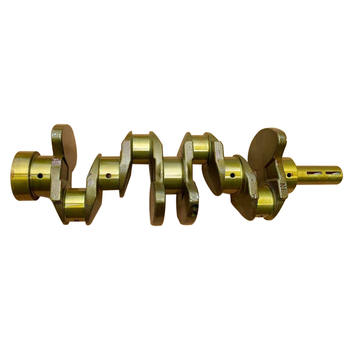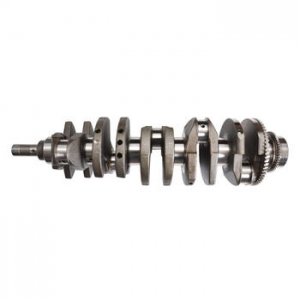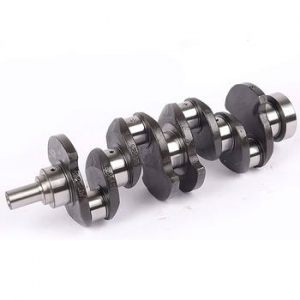The crankshaft, specifically the Crankshaft for Hyundai Elantra 1.6 - OEM 23110-2B610 (toothed), is a critical component in your vehicle's engine. It's the heart of the power conversion process, taking the linear motion of the pistons and turning it into the rotational force that drives your wheels. Understanding its function, potential issues, and the importance of using the OEM part is crucial for maintaining your Elantra's performance and reliability. This article will delve into these aspects, providing a comprehensive overview of this essential engine component.
Understanding the Crankshaft's Role in Your Elantra 1.6 Engine
The crankshaft, as mentioned, is the link between the linear movement of the pistons and the rotational output that powers your car. In a Hyundai Elantra 1.6, the pistons, driven by the combustion of fuel and air, push down on the connecting rods. These rods, in turn, are connected to the crankshaft. As the pistons move up and down, they force the crankshaft to rotate. This rotation is then transmitted through the drivetrain to the wheels, propelling the vehicle forward. The "toothed" designation in the title refers to the timing gear teeth on the crankshaft, which synchronize the crankshaft's rotation with the camshaft, ensuring proper valve timing for optimal engine performance. Maintaining the integrity and precision of these teeth is vital.
OEM 23110-2B610: What Does It Mean for Your Hyundai Elantra 1.6?
OEM stands for Original Equipment Manufacturer. In this context, OEM 23110-2B610 signifies that this crankshaft is manufactured by or to the exact specifications of Hyundai for the Elantra 1.6 engine. Choosing the OEM part ensures a perfect fit, proper material composition, and adherence to the precise tolerances required for optimal engine function. While aftermarket alternatives might be cheaper, they often compromise on quality and may not meet the stringent requirements of the original engine design. This can lead to premature wear, reduced performance, and potentially even engine damage. So, is the initial cost savings really worth the risk when considering the long-term consequences?
Common Issues and Symptoms of a Failing Crankshaft
A failing crankshaft can manifest in several ways. One of the most common symptoms is unusual engine noise, often described as a knocking or rattling sound. This noise might be more pronounced during acceleration or when the engine is under load. Another sign can be vibrations, which can be felt through the steering wheel or the seats. These vibrations are usually caused by an imbalance in the crankshaft’s rotation. Furthermore, issues like decreased engine power, rough idling, and even complete engine failure can occur if the crankshaft is severely damaged. Catching these symptoms early and addressing them promptly is key to preventing more extensive and costly repairs.
Why Choosing the OEM Crankshaft (23110-2B610) Matters
Honestly, skimping on engine components is rarely a good idea, and the crankshaft is definitely not one to compromise on. Choosing the OEM crankshaft (23110-2B610) for your Hyundai Elantra 1.6 offers several key advantages. First and foremost, it guarantees compatibility. The OEM part is designed to fit perfectly within the engine block, ensuring proper alignment and minimizing stress on other engine components. Secondly, the OEM crankshaft is manufactured using high-quality materials and undergoes rigorous testing to ensure durability and reliability. This translates to a longer lifespan and reduced risk of failure, saving you money and hassle in the long run. Finally, using the OEM part helps maintain the original performance and efficiency of your Elantra's engine.
Installation and Maintenance Tips for Your New Crankshaft
Installation of a crankshaft is a complex procedure that typically requires specialized tools and expertise. It's highly recommended to have a qualified mechanic perform the installation to ensure it's done correctly. Improper installation can lead to serious engine damage. Before installation, thoroughly inspect the new crankshaft for any signs of damage. During installation, ensure proper lubrication and torque specifications are followed meticulously. After installation, regular oil changes are crucial for maintaining the crankshaft's health. Clean oil helps to lubricate the moving parts, reduce friction, and prevent wear. Monitoring engine oil pressure is also important, as low oil pressure can indicate issues with the crankshaft bearings.
Real-World Application: When We Encountered Crankshaft Issues on an Elantra 1.6
We had a customer bring in a Hyundai Elantra 1.6 experiencing significant engine knocking. Upon inspection, we discovered damage to the crankshaft bearings due to oil starvation. The original crankshaft was beyond repair. We advised the customer to opt for the OEM 23110-2B610 crankshaft. After installation, the engine ran smoothly and quietly, restoring the vehicle's performance. The customer was extremely satisfied with the outcome, highlighting the importance of using genuine parts for critical engine repairs. This situation really drove home the point that cutting corners on essential parts can lead to bigger problems down the road. It’s always best to invest in quality, especially when the heart of your car's engine is involved. Furthermore, according to my experience, preventative maintenance is far cheaper than replacing this crucial component.
The Role of the "Toothed" Design in Engine Timing
The "toothed" design of the Crankshaft for Hyundai Elantra 1.6 - OEM 23110-2B610 is crucial for maintaining accurate engine timing. These teeth mesh with the timing belt or chain, which in turn drives the camshaft. The camshaft controls the opening and closing of the engine valves, ensuring that air and fuel enter the cylinders at the correct time and exhaust gases are expelled efficiently. Precise timing is essential for optimal combustion, fuel efficiency, and engine performance. If the teeth are damaged or worn, it can disrupt the timing, leading to misfires, reduced power, and potential engine damage. This is why the condition of the timing teeth should be regularly inspected, especially during routine maintenance.
Considering Aftermarket Options: A Word of Caution
While aftermarket crankshafts for the Hyundai Elantra 1.6 might seem tempting due to their lower price, it's important to exercise caution. Aftermarket parts often lack the same level of quality control and precision as OEM parts. They might be made from inferior materials or have looser tolerances, which can lead to premature wear, reduced performance, and even catastrophic engine failure. Furthermore, using aftermarket parts can sometimes void the vehicle's warranty. Before considering an aftermarket option, carefully research the manufacturer's reputation and ensure the part meets or exceeds the OEM specifications. Honestly, for a component as critical as the crankshaft, the peace of mind that comes with using the OEM 23110-2B610 is often worth the extra investment. You have to weigh the initial savings against the potential for much bigger costs later on. That’s just a prudent financial decision in the long run.
Final Thoughts: Protecting Your Hyundai Elantra 1.6's Engine
The Crankshaft for Hyundai Elantra 1.6 - OEM 23110-2B610 (toothed) is a fundamental component that demands attention and care. Choosing the OEM part ensures compatibility, reliability, and optimal performance for your engine. Remember, a healthy crankshaft translates to a healthy engine and a reliable vehicle. Regular maintenance, prompt attention to any warning signs, and the use of genuine parts are all crucial for protecting your investment and keeping your Hyundai Elantra 1.6 running smoothly for years to come. Do you regularly inspect your car's engine for unusual noises, particularly knocking or rattling? Such sounds can be early indicators of crankshaft or related issues.




